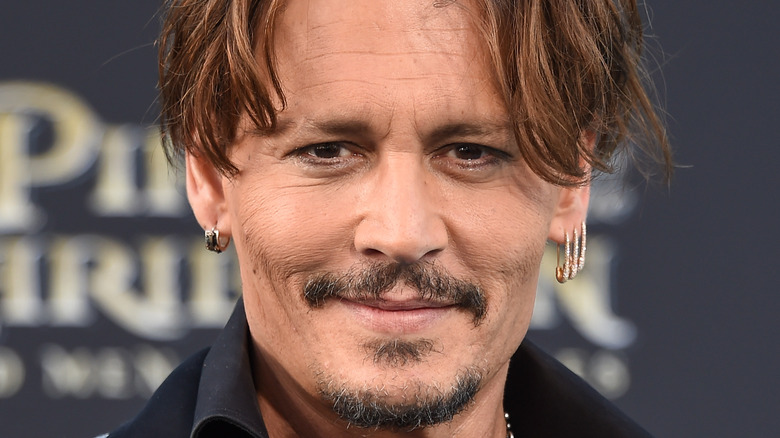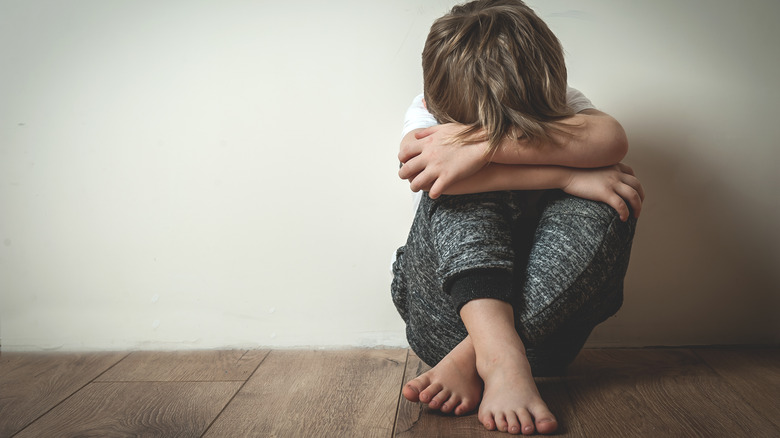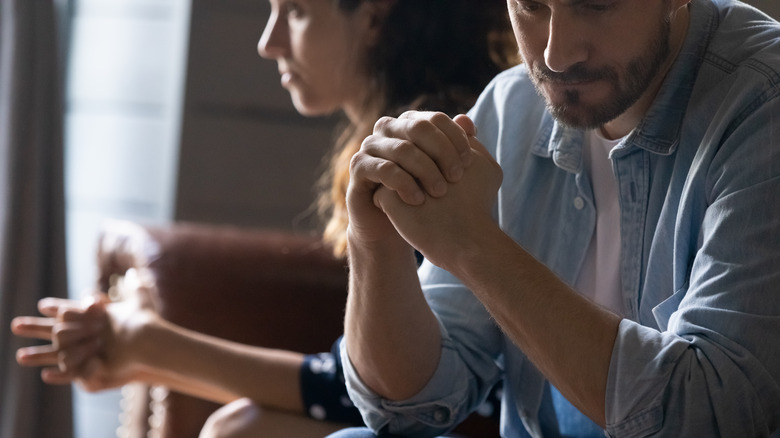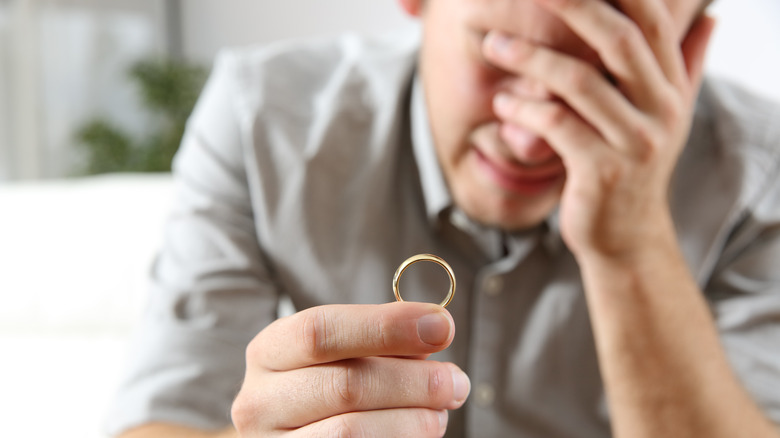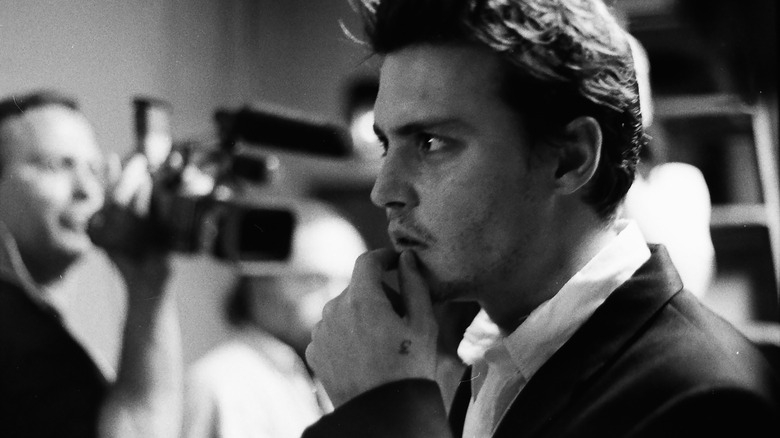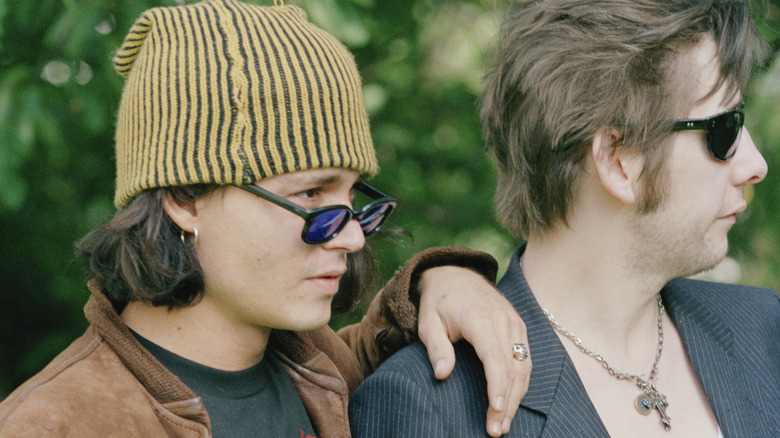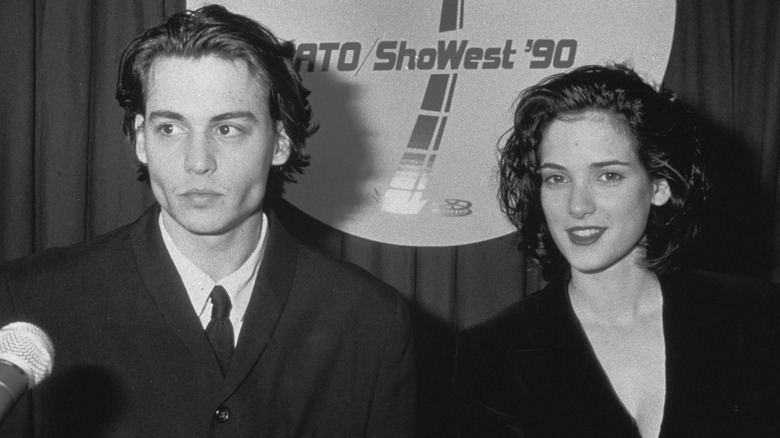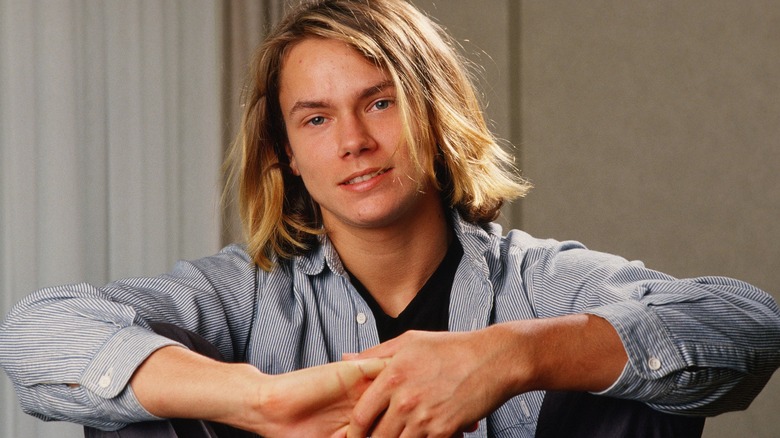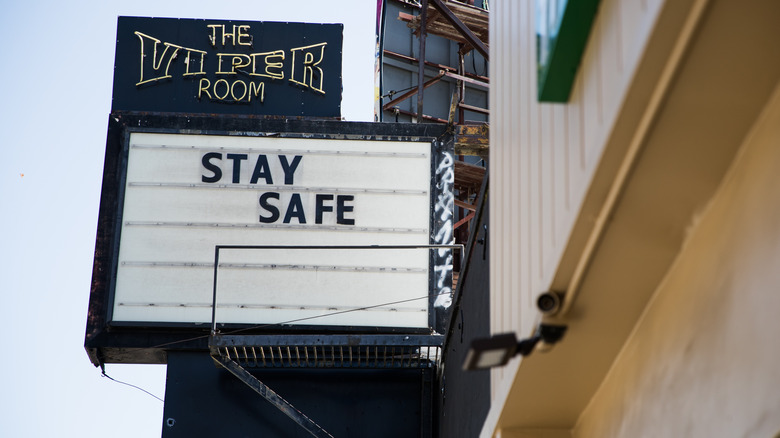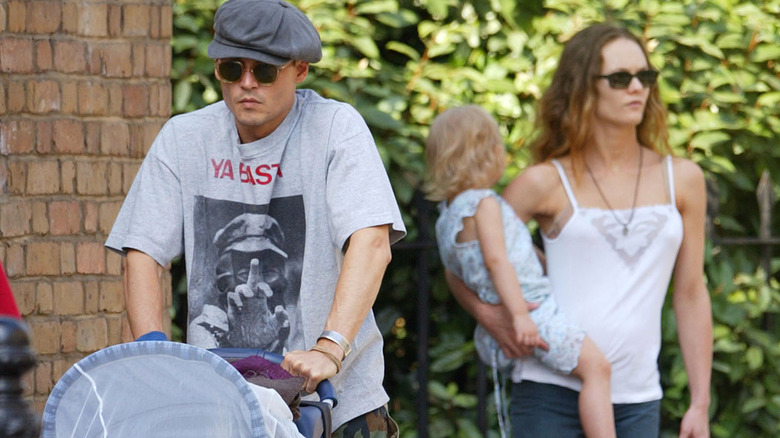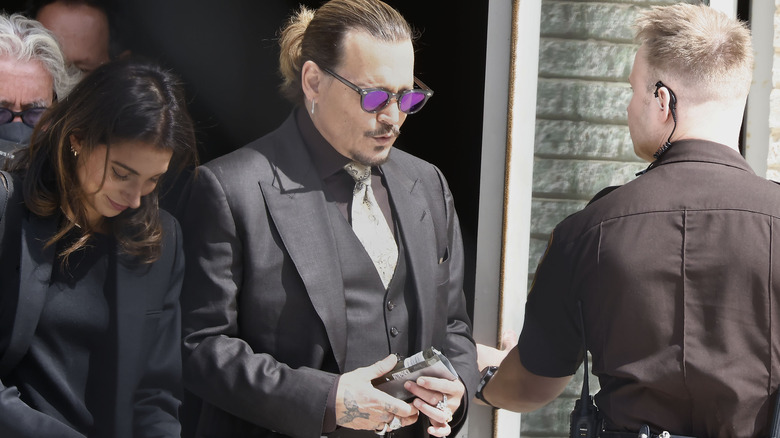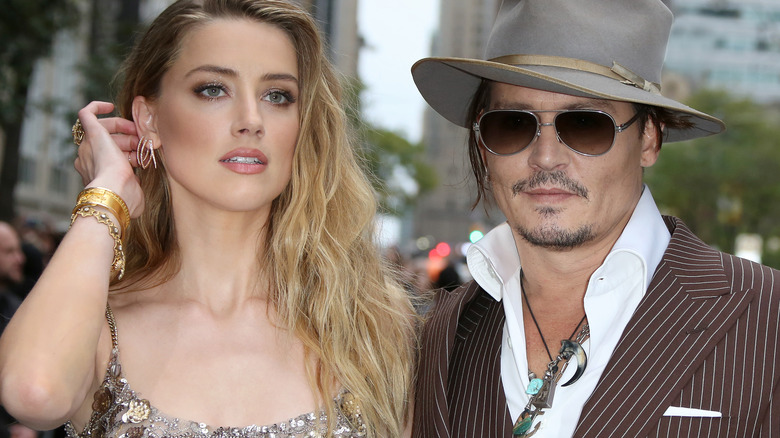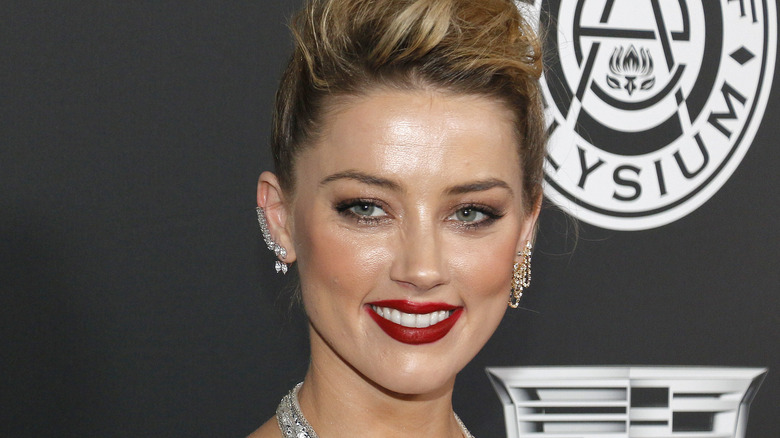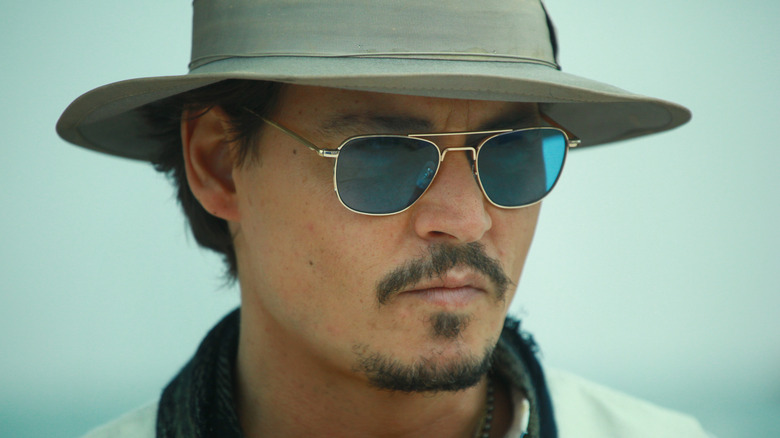The Tragic Real-Life Story Of Johnny Depp
Correction 05/11/22: A previous version of this article stated that Vanessa Paradis was Johnny Depp's ex-wife. Paradis and Depp were in a relationship but never married.
Johnny Depp and Amber Heard met in 2009 on the set of "The Rum Diary," according to CNN. The movie is based on a book by Hunter S. Thompson and follows the alcohol-fueled misadventures of writer Paul Kemp (Johnny Depp) who obsesses over Chenault (Amber Heard). Depp and Heard were both in relationships during filming but reconnected a few years later. They married in 2015 and divorced in 2016, and the fallout from their brief marriage has proven monumental (via CNN).
Depp sued Heard in 2019 for $50 million, alleging a Washington Post op-ed she penned in 2018 about domestic violence irreparably harmed his career. Although Heard's counsel moved to have the defamation trial dismissed, it went to court in 2022. Heard's attorneys have since filed a $100 million countersuit, which means the two actors will likely stay entangled in legal battles for the foreseeable future.
During the defamation trial, Depp spent a total of four days on the witness stand, laying bare his private life. In one pivotal moment, he alleged being the victim of domestic abuse. The typically private actor also opened up about tragic details from his childhood and how his parents' failed relationship dynamic predisposed him to suffer an allegedly toxic and violent relationship with Heard. Here's what you need to know about the tragic real-life of Johnny Depp and his 2022 defamation trial against ex-wife Amber Heard.
Johnny Depp was terrorized by his abusive mother
We've learned a lot about Johnny Depp and Amber Heard's broken marriage since their divorce began in 2016. But the defamation case, which Depp initiated in 2019, has also provided us plenty of information about Depp's tragic childhood. Born on June 9, 1963, in Owensboro, Kentucky, John Christopher Depp II (Johnny Depp) was the youngest of four children born to Betty Sue Palmer and John Christopher Depp, per Danny White's "Johnny Depp: The Unauthorized Biography." Throughout his childhood, his mother's abuse proved constant, unpredictable, violent, and cruel.
He later remarked about these formative years, "I felt completely and utterly confused by everything that was going on around me" (via "Johnny Depp: The Unauthorized Biography"). On the witness stand, he explained that his childhood lacked both safety and security, per Law & Crime Network. He said his mother excelled at physical and verbal abuse with lots of bullying and name calling. She proved especially good at lobbing cruel, personal attacks against her children, mocking them for various perceived physical defects.
For example, Depp's brother wore glasses, and so his mother referred to him as "four eyes." As for Depp, he had a rare congenital eye defect, which translated into a lazy eye and having to wear a patch, as reported by Law & Crime Network. So, his mother created a list of mean taunts for him, too, including "cock eye," "one eye," and anything else she could muster to steep him in shame.
If you or someone you know may be the victim of child abuse, please contact the Childhelp National Child Abuse Hotline at 1-800-4-A-Child (1-800-422-4453) or contact their live chat services.
His father set an example of the battered spouse
During his four days of testimony, Johnny Depp provided insights about why he might willingly stay in an abusive relationship, per Law & Crime Network. The example for this inexplicable behavior came from his father, John Christopher Depp, who remained patient with Betty Sue Palmer despite years of escalating abuse. According to Depp, his mother could be as cruel as possible, directing her anger, frustration, and hatred towards those closest to her.
Speaking about his dad's behavior around his mother, Depp noted, "There was never one moment ... when my father lost control and attacked my mother or hit my mother or even said a bad thing to my mother" (via Law & Crime Network). But the same couldn't be said for Palmer. These episodes happened in front of Depp and his siblings, providing Depp with a dysfunctional, though stoic, example of masculinity in the face of domestic violence.
This awful familial dynamic taught Depp to swallow his pain and take it. By extension, this logic appears to explain why Depp, a world-renowned actor adored by millions of fans, would find himself mired in an abusive relationship with ex-wife Amber Heard. Well, at least that's the case his attorneys attempted to present to the jury.
If you or someone you know is dealing with domestic abuse, you can call the National Domestic Violence Hotline at 1−800−799−7233. You can also find more information, resources, and support at their website.
He grew up rootless due to his mother's wandering ways
Coupled with cruelty and unpredictable behavior, Betty Sue Palmer had a restless nature that fueled constant family moves. In an interview with Oprah, Johnny Depp reported moving "maybe 40 times" before the age of 15. One of the most restless periods of his life occurred after his family left Kentucky for Florida, according to Danny White's "Johnny Depp: The Unauthorized Biography." They ended up in Miramar, located in the southern part of the state near Miami.
Depp remembers it as a place where very little actually happened. But he does recall the family living in motels after they first arrived. This is where the bulk of the 40 moves he quoted to Oprah took place. During this small period alone, he estimates the family shuttled between 20 to 30 different locations, resulting in a truly transient lifestyle.
White hypothesizes that this may be why Depp later gravitated towards playing outsiders as an actor. With so many relocations under his belt at such a young age, he lacked the stability and geographic longevity to become truly integrated into a community. He likened it to a Roma (also known as Gypsy) lifestyle, noting it got so bad he stopped introducing himself at school or trying to make friends. What's more, he remembers leaving many of his belongings behind with each move, exacerbating the sense of aimless wandering (via "Johnny Depp: The Unauthorized Biography").
Johnny Depp's father walked out
At the age of 15, in 1978, John Christopher Depp could no longer take the abuse hurled at him by Betty Sue Palmer, and so he walked out on the family (via Law & Crime Network). Johnny Depp drove to his father's work to confront him about leaving, and his dad told him he'd had enough. He also put Depp in charge of the household. This triggered a depressive state in his mother, culminating in attempted suicide, per Law & Crime Network.
Depp testified he woke up from a nap to find Betty Sue Palmer staggering around the room feebly. Describing it as a "slow-motion crawl," Depp immediately realized something was terribly wrong. Fortunately, his uncle and two paramedics soon showed up and took her away to the hospital. After having her stomach pumped, they found she had downed a cocktail of pills, attempting to kill herself.
After getting out of the hospital, Palmer continued to lose weight and spiral downwards. Depp couldn't help but resent his father for leaving the way that he did. He wouldn't understand until years later why his father had to go. Describing how Depp felt about his father, he stated, "I was very disappointed in him because I started to believe that his exit was sneaky, cowardly" (via Law & Crime Network).
If you or anyone you know is having suicidal thoughts, please call the National Suicide Prevention Lifeline at 1-800-273-TALK (8255).
Johnny Depp suffered from a disorder similar to Tourette's
"Johnny Depp: The Unauthorized Biography" chronicles a disorder the future actor had as a child. At times, Depp felt compelled to do things twice. His parents also noted that he sometimes made strange noises, a behavior bordering on Tourette's syndrome.
Early in his career as an actor, this condition resurfaced. It happened during a period when he enjoyed the successes and pressures of "21 Jump Street" fame. And he also experienced conflicting emotions about promoting the show and feeling trapped by it. This swirl of stress and pressure manifested in an embarrassing way on a fully booked flight to Vancouver, Canada, for more filming. On the flight, he sat in first class and experienced a sudden and uncontrollable urge to yell one of the most embarrassing things he could imagine.
He yelled out, "I f*** animals!" ushering in a deafening silence. Eventually, a polite passenger near him broke this by asking, "What kind?" Fortunately, this lightened the mood. In the years to come, Depp would sometimes speak of Tourette's as an admirable disorder, which is interesting in this context. Although the disorder hasn't plagued him over the years, it may have exacerbated the sense of alienation he already felt due to his unsettled and difficult childhood.
Johnny Depp dropped out of high school
Before launching his acting career on "21 Jump Street," Johnny Depp had dreams of making it big as a rock star, according to Business Insider. During his time in Miramar, Florida, he played with a group called the Kids, enjoying local fame. Eventually, they decided to take the leap and relocate to Los Angeles (via Britannica).
Soon, Depp struggled as an unemployed musician. After marrying Lori Anne Allison, a makeup artist, in 1983, she introduced him to her friend Nicolas Cage, per Britannica. According to an interview with Oprah, Cage suggested Depp give acting a try. But Depp had never thought about this line of work before. Nevertheless, he needed to pay the rent and was on the edge of getting evicted, so he gave it a try.
Cage arranged an audition for Depp with Director Wes Craven, and Depp got cast in 1984's "A Nightmare on Elm Street." As Vanity Fair reports, Craven's daughter, Jessica Craven, helped pick him for the role of Glen (who would experience one of the bloodiest deaths in the franchise), and Depp remembers reading scenes with her. Depp has jokingly said of his big break, "At the time, I was a musician. I wasn't really acting. It was not anything very near to my brain or my heart, which is pretty much how it remains to this day."
Public scrutiny ended his engagement to Winona Ryder
In 1985, Johnny Depp and Lori Anne Allison got divorced, and two years later he faced a different kind of break after parting ways with "21 Jump Street," per Britannica. By 1990, he worked with John Waters on "Cry-Baby" and Tim Burton on "Edward Scissorhands." Both indie film directors permitted Depp to explore his talent in innovative ways.
Winona Ryder played Depp's love interest in "Edward Scissorhands," but they'd already started a romantic relationship in 1989 after meeting at the premier of "Great Balls of Fire." Ryder played the young, naïve bride of Jerry Lee Lewis opposite Dennis Quaid. For Depp, it was love at first sight: "It was a classic glance. Like the lenses in 'West Side Story' and everything else gets foggy" (via "Johnny Depp: The Unauthorized Biography"). Before the two knew it, they'd moved in together. Depp quickly followed this living arrangement with a proposal, and the two looked like the ideal couple. Unfortunately, this meant the media hounded the duo at every turn.
Despite his enthusiastic passion for his fiancée, which even inspired him to get the tattoo "Winona Forever," their youthful relationship wouldn't last. Both celebrities found themselves on the rise at the same time, which meant little time or energy left for their relationship. Depp publicly spoke about their split for the first time in June 1993, spinning it in a positive light. But a friend close to the actor said he remained in denial for months.
River Phoenix died outside his night club, the Viper Room
By August of 1993, Johnny Depp bought the Viper Room, an infamous Los Angeles location with a colorful history, per Playground of the Stars. Acquiring the location let Depp re-ignite his first love, music, per "Johnny Depp: The Unauthorized Biography." Some nights after closing, Depp would stay into the wee hours, indulging in private jam sessions. Friend and Viper Room regular Morty Coyle explained, "You've got a guy who, for all intents and purposes, is not taken seriously for what he's really in love with, so he ends up making a home for himself to have that."
But the death of River Phoenix just two months later cast Johnny Depp's night club in a negative light, according to "Johnny Depp: The Unauthorized Biography." Speculation abounded about what had happened, and newspapers characterized the Viper Room as "Depp's Den of Sex, Drugs, and Death." This speculation proved especially hurtful, as Depp had been close to Phoenix and mourned the loss of his friend deeply.
Depp fought back against the tabloid treatment of his club and the mischaracterization of what had happened. The media especially honed in on the idea people freely used drugs at the Viper Room, but Depp refuted such claims. In an interview with USA Today (as quoted by "Johnny Depp: The Unauthorized Biography"), he argued, "To pinpoint one club or one street is really ridiculous. There's a tragic loss of a very gifted, very sweet, nice young man."
Rumors swirled around his business partner's disappearance
The controversy surrounding the Viper Room didn't begin and end with the River Phoenix tragedy. Another bizarre event involving Johnny Depp's night club business partner, Anthony Fox, would impact the actor's reputation, per the Charley Project. And it's the kind of story that's straight out of a true crime episode of "Dateline," just without Keith Morrison's iconic narration.
On December 19, 2001, Fox disappeared in Ventura County, California along with a .38 caliber handgun and his pickup truck. The truck turned up on January 6, 2002, in Santa Clara with no sign of Fox's whereabouts. He left behind a teenage daughter and several thousand dollars in a bank account that never saw action again.
Fox vanished while preparing to testify in court about financial problems related to the Viper Room, which he co-founded with Depp in 1993. That said, no charges have been brought against the actor in connection with the missing man. In 2004, Depp handed his ownership in the Viper Room over to Fox's daughter, Amanda Fox, as reported by The National News.
Johnny Depp's daughter faced childhood illness
In 2007, Johnny Depp faced every parent's worst nightmare, according to People. His daughter, Lily-Rose Depp, 7, with Vanessa Paradis, contracted E. coli, leading to kidney failure. Depp and Paradis spent nine days camped out at a hospital in London unsure of whether their daughter would live, according to People.
Fortunately, Lily-Rose recovered, but the experience proved transformative for the actor. He has never forgotten how helpless he felt during the ordeal. In an interview on the Graham Norton Show (quoted by People), he stated, "When my daughter was ill in Great Ormond Street, it was the darkest period of my life." In 2008, following his daughter's recovery, Depp donated $2 million to the Great Ormond Street Hospital.
Although Depp always made a point of visiting children's hospitals, he increased these activities following his family's scare. After starring in "Pirates of the Caribbean," dressing up as Captain Jack Sparrow became his regular modus operandi. But after his marriage to Amber Heard dissolved and she accused him of domestic abuse, Disney cut ties with the actor and his character Captain Jack Sparrow (via Variety). This development made something as innocuous as visiting a children's hospital in costume complicated, to say the least.
He claims to be the victim of domestic violence
After marrying in 2015, Johnny Depp and Amber Heard's marriage quickly unraveled in a whirlwind of drug and alcohol abuse, as both parties allege, as reported by Newsweek. But when it comes to which person in the marriage endured the brunt of the violence, the former couple's stories differ.
The accusations of violence began with Heard, who filed a restraining order against Depp after filing for divorce in 2016, per USA Today. During stunning testimony in his defamation lawsuit, Johnny Depp gave his side of the story. He detailed the verbal, emotional, and physical abuse he allegedly endured at the hands of his ex-wife. From having his finger partially cut off to finding human feces in his bed, the actor graphically described the horror of his marriage, finishing with the confession that he has been a victim of domestic violence, according to News 18.
He stated, "No one deserves to live like that." His bodyguard, Starling Jenkins, also took the witness stand to testify about a time when Heard allegedly threw Depp's phone off the balcony during a fight (via the Insider). Fortunately, Jenkins retrieved it from a homeless man on Skid Row, paying him $420 along with potato chips, apples, Fiji water, and chicken tacos, per Rekieta Law.
If you or someone you know is dealing with domestic abuse, you can call the National Domestic Violence Hotline at 1−800−799−7233. You can also find more information, resources, and support at their website.
Amber Heard made insane demands during the divorce
According to Insider, once the couple agreed to divorce, the demands from Amber Heard began, as recorded in a demand letter entered as evidence in the defamation trial. These demands included Heard's desire to live rent-free in the apartments the couple had owned along with $125,000 to help with her attorney's fees. She also asked for exclusive ownership of a black Range Rover, stipulating that Depp make the rest of the payments on it.
In exchange for fulfilling the requirements of the letter, Heard promised to keep the divorce proceedings and personal details of their relationship out of the spotlight. As time progressed, however, Heard's demands increased, according to Edward White, Depp's business manager (via Rekieta Law). During his testimony in the defamation trial, he claimed that Heard eventually asked for $4 million.
But she didn't stop there. Next, her demand increased to $5 million and then up from there, spiking at $7 million with $500,000 in fees to her attorneys. Yet, White said the sky was the limit because Heard went on to demand all community liabilities accumulated during the marriage (a total of $13.5 million). The demands would continue until they reached $14,250,000 of consideration paid to her free of taxation.
Accusations from Amber Heard in an op-ed exacerbated Depp's financial woes
Amber Heard published a Washington Post op-ed in 2018 detailing domestic violence without directly naming Johnny Depp. But the timeline of events outlined meshed with those of their marriage. As a result, Depp claims Disney dropped him from "Pirates of the Caribbean 6," where he stood to net $22.5 million, per Variety. Other film studios dodged the actor, too. Mike Spindler, a forensic accountant, calculated that Depp lost $40 million in Hollywood earnings after the op-ed (via CNN).
Unfortunately, his business manager, Edward White, had already sounded the alarm that Depp's finances were in serious disrepair, according to Variety. Just prior to Heard's 30th birthday, Depp learned he'd lost $650 million earned from movies due to alleged financial mismanagement. This included purportedly owing 17 years of back taxes to the IRS worth a total of $100 million.
In 2019, Depp brought a defamation suit against Heard for $50 million, per CBS News. But Heard countered with a $100 million lawsuit (via Vanity Fair). Her counsel argued that Depp's rejection of her abuse claims amount to defamation. After all, Heard positioned herself (in the op-ed) as an advocate for those facing domestic violence: "I spoke up against sexual violence — and faced our culture's wrath. That has to change." But as the Independent reports, Heard was arrested in 2009 for "misdemeanor domestic violence" against her then-girlfriend Tasya van Ree, which muddies the waters of a breakup awash in financial wreckage.
Johnny Depp has struggled with drug and alcohol addiction
During the defamation lawsuit, details emerged about Johnny Depp's struggles with drug and alcohol addiction. In a 2005 interview with Rolling Stone, Depp admitted, "I spent years poisoning myself ... I was very, very good at it." But during his testimony at the defamation trial, Depp discussed his attempts to end his addiction after an intervention by his sister, Christi Dembrowski, in 2014 (via Law & Crime Network).
Dr. David Kipper took the stand on the third day of Depp's defamation lawsuit, detailing the actor's history of drug use and attempts to get sober, as reported by Huffpost. He noted that Depp has a history of abusing opiates, alcohol, cocaine, and benzodiazepines and that Depp sought his help with detoxing. During his testimony, Dr, Kipper described the many times that Depp attempted to stop the detoxification process. And he also discussed receiving text messages from the actor mentioning Heard but otherwise incoherent.
While on the witness stand, Depp alleged that Heard made him beg for medication while he experienced withdrawals, via Law & Crime Network. He also claimed Heard undermined his efforts to get sober, as reported by Lasting Recovery. Although we may never know exactly what occurred between Heard and Depp, the presence of addiction in their marriage made for an uncomfortable third party.
If you or anyone you know is struggling with addiction issues, help is available. Visit the Substance Abuse and Mental Health Services Administration website or contact SAMHSA's National Helpline at 1-800-662-HELP (4357).
